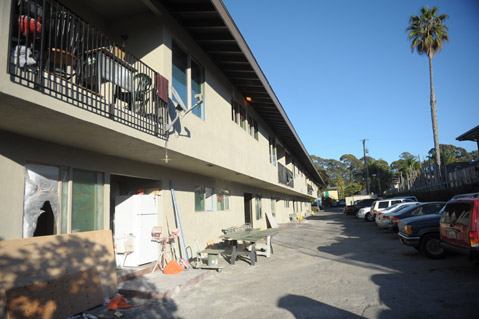Test of Tenants’ Rights
Mass Isla Vista Evictions Raise Flags and Feelings of Déjà Vu

Until recently, 24 Latino families lived in an Isla Vista apartment complex at 781 Embarcadero del Norte. Most have school-age children whose parents work at nearby UCSB or in I.V. Today, 16 of those families have been evicted, and four have received notice.
The sudden change — what a tenants advocacy group and an attorney say is a deliberate and unfair move to replace low-income residents with higher-rent payers — may trigger a county ordinance that forces landlords to provide relocation funds in such situations. It would be the first time the ordinance’s provisions were enacted. But new building management seems to be fighting the claim, asserting the ordinance designed to protect tenants doesn’t apply in this case.
The apartment complex changed hands on April 27, when it was bought by Platler Capital Management, based in San Clemente. Four days later, building manager Matt Platler raised the rent of all units — which start with a one-year lease, but then go month to month — by 10 percent. In June, massive remodeling on the property began, and eviction notices started arriving.
The construction, still ongoing, has bothered the many residents immensely. Israel Hernandez, who Platler said must move out by December 8, explained, “Every day, construction people walk in and out of the house. They went into my bedroom while my wife was sleeping. It’s not good.” Another woman, who declined to give her name, expressed concerns that her balcony screens had not been replaced for three months, and that it was unsafe for her 6-year-old child.
Renters, initially concerned by the construction, contacted the Isla Vista Tenants Union (IVTU), an organization funded by UCSB. When IVTU learned about the evictions, they informed the evicted tenants that they may be entitled to compensation under a 2010 amendment to County Ordinance 4444.

“The ordinance says that they are entitled to relocation assistance because the landlord did not provide alternate housing or offer to allow the tenants to move back in after the construction,” said Hilary Kleger, a community advisor with IVTU. According to Kleger, when IVTU contacted Platler to inform him that he owed money to the evicted tenants, his attorney replied that the ordinance isn’t applicable. No response came when IVTU protested.
However, two days after the correspondence, at least one tenant received an offer to rescind her eviction and received offers for alternative housing. The offer came too late, however, as the tenant was already due to vacate her apartment. Kleger claims that evicted tenants are owed $10,500 each.
For the 16 families who have already moved out, “It seems pretty clear that they are entitled to relocation assistance,” said Robin Unander, an attorney representing the tenants. Since the four families that have not yet vacated their homes have been offered alternative housing, they may not be eligible for compensation. Unander took issue with the fact that under the county ordinance “there are no controls on rent” for the alternative housing that is offered.
Platler is also the manager of a 28-unit apartment building at 203 Ladera Lane. Earlier this year, he and property owner Daniel Smith withdrew from participating in the federal Section 8 housing program and evicted 13 tenants. Platler was also overseeing the 6631 Picasso Road complex in Isla Vista when 10 families were evicted two years ago. According to Kleger, one of the families that was evicted from the Picasso property has been evicted again at the Embarcadero del Norte complex. Platler refused to comment for this story, and his attorney Brad Lundgren could not be reached.
Kleger is dismayed by what she sees as a growing trend of Los Angeles developers coming to Santa Barbara and engaging in practices that are “discriminatory” toward Latino and low-income tenants. “This is exactly the type of landlord/developer that we were concerned about when we were looking to amend Ordinance 4444.”



